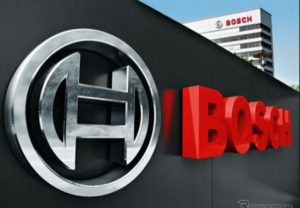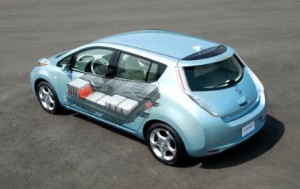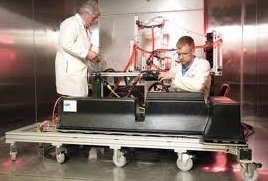by Jon LeSage, editor and publisher, Green Auto Market
Here’s my take on the 10 most significant and interesting occurrences during the past week…….
 Who will lead EV battery market?: The race is on to be the leader in advanced batteries for plug in electric vehicles with auto parts giant Robert Bosch buying California-based Seeo Inc., which is developing lithium-ion batteries that could double the range of electric vehicles (EVs). While EV and hybrid sales have been softening this year, the consensus seems to be that lithium batteries will be increasing in demand for EVs and energy storage. Seeo is a solid-state battery developer of next-generation energy storage, and the acquisition includes all of the company’s IP and research staff. “For now, solid-state batteries are the best positioned to take that crown, but other families like lithium-sulfur, high-voltage cathodes, and alternative ions are worth watching, too,” said Lux Research Senior Analyst, Cosmin Laslau. It’s not surprising to see a Tier One supplier in the auto industry enter the lithium battery space. Tesla Motors and Panasonic are preparing to lead the way in volume at the Gigafactory in Nevada; with Tesla investing in the energy storage market, as well. Nissan is half owner of battery maker AESC, and LG Chem is doing lithium-ion battery business with several major automakers.
Who will lead EV battery market?: The race is on to be the leader in advanced batteries for plug in electric vehicles with auto parts giant Robert Bosch buying California-based Seeo Inc., which is developing lithium-ion batteries that could double the range of electric vehicles (EVs). While EV and hybrid sales have been softening this year, the consensus seems to be that lithium batteries will be increasing in demand for EVs and energy storage. Seeo is a solid-state battery developer of next-generation energy storage, and the acquisition includes all of the company’s IP and research staff. “For now, solid-state batteries are the best positioned to take that crown, but other families like lithium-sulfur, high-voltage cathodes, and alternative ions are worth watching, too,” said Lux Research Senior Analyst, Cosmin Laslau. It’s not surprising to see a Tier One supplier in the auto industry enter the lithium battery space. Tesla Motors and Panasonic are preparing to lead the way in volume at the Gigafactory in Nevada; with Tesla investing in the energy storage market, as well. Nissan is half owner of battery maker AESC, and LG Chem is doing lithium-ion battery business with several major automakers.- Ridesharing sees breakthrough: It’s taken a little while, but ridesharing/ride-hailing companies Uber and Lyft have been granted permission to pick up passengers at Los Angeles International Airport (LAX), one of the largest airports in the U.S. The taxi industry had spent a lot of money attempting to defeat it, and there’s been intense debate about whether drivers are being given enough background checks for passenger safety. City officials will continue researching whether more extensive background checks will be required, including fingerprinting.
- Enterprise carsharing taking off in Boston: Enterprise Rent-A-Car has seen huge growth in carsharing users through its Boston Enterprise CarShare fleet. Since acquiring Mint Cars On-Demand and building its presence in the market, Enterprise has seen membership grow more than 300% in the city. Enterprise CarShare now has a retail presence in Chicago, Philadelphia, New York City, Toronto, and Washington, D.C., and other markets. In total, the service is available in more than 35 U.S. states, Canada and the U.K – and offered through more than 100 university campuses and hundreds of business and government accounts across the country.
- Alt-fuel vehicle conversions have a strong week: Anheuser-Busch is converting all 97 of its diesel-fueled tractors throughout the Midwest to compressed natural gas in an effort to reduce carbon dioxide emissions. The company first converted 66 diesel trucks at its Houston brewery last year…… General Distributors Inc. reported that since switching 10 cargo vans from gasoline to propane autogas, the beverage distributor has cut greenhouse gas emissions 20% and saved about $10,000 in fuel costs……. amp Trillium has opened of a new public-access compressed natural gas station in Newport, TN. The station can also fuel multiple Class-8 trucks simultaneously with Trillium CNG’s proprietary fast-fill hydraulic intensifier compressors, which efficiently pump seven-to-12 gallons of CNG fuel per minute, similar to diesel fueling rates……. Clean vehicle and fuel provider Alliance AutoGas has received new U.S. Environmental Protection Agency (EPA) certifications covering the following vehicles: Ford Taurus Interceptor 3.5L (2015, 2014, 2013), Ford Explorer Interceptor 3.5L and 3.7L (2016, 2015, 2014, 2013), Dodge Charger 3.6L (2015) and Dodge Charger 5.7 HEMI (2015, 2014, 2013). Specifically of interest to U.S. law enforcement fleets are the certifications of the Explorer Police Interceptor, Taurus Police Interceptor, and Charger Pursuit.
- Tesla scores big with Consumer Reports: Tesla Motors just received another strong review from Consumer Reports, earning a 103 on a 100-point scale for its Model S P85D, setting what the magazine staff calls a new standard for perfection. The team testing out the “insane mode” that can go from zero to 60 in 3.5 seconds. In other news, Tesla Motors has been drawing complaints in California from dealers on discounts offered to Tesla buyers for making referrals. A letter from the California New Car Dealers Association argues that the program is illegal under a state law that bans compensation of people who arrange sales without a license – a practice known in the car business as “bird dogging.” Tesla is offering current owners $1,000 off their purchase price and will also receive a $1,000 discount that can be applied to a new Tesla car purchase in the future, a service center visit, or accessories.
- Award winners announced at Fleet Technology Expo: At the first-ever (former Green Fleet Conference) Fleet Technology Expo last week in Long Beach, Calif., six fleet managers took awards for sustainability and efficiency categories for Light & Medium Duty Fleets. During the Fleet Technology Expo’s Light & Medium Duty Fleet awards winners of the sustainability category are Alameda County, the University of Pittsburgh Medical Center (UPMC), and the Eugene (Ore.) Water and Electric Board. DISH, NPL Construction, and Osram Sylvania took home top honors in the efficiency category. For HDT (heavy-duty truck) fleets, Con-way Freight, Toyota, and Celadon Trucking Services won awards for HDT Efficiency. Republic Services, Raven Transport, and Ryder System received the awards for HDT Sustainability.
- Wheego staying quiet for now: Small electric car manufacturer Wheego Electric Cars has put production of electric vehicles on hold for now, and will no longer build the Whip or LiFe. “We are not making the Whip or LiFe any more, but still support and service the cars. We are working on two new models which will first be introduced in China, followed a few years later by introduction to the U.S. market.”
- New president at EDTA: The Electric Drive Transportation Association (EDTA) Board of Directors appointed Genevieve Cullen to the position of President. Cullen previously served as EDTA Vice President, developing and leading the organization’s policy program. “As the electric drive market enters an exciting new phase, we are fortunate to have a leader with Genevieve Cullen’s outstanding record and unique understanding of the industry to advance EDTA’s mission,” said Tracy Woodard, the chair of EDTA’s Board of Directors.
- 2K vehicles in voucher program: The California Air Resources Board, elected officials and industry last week celebrated the 2,000th Hybrid and Zero-Emission Truck and Bus Voucher, awarded to Redwood Products of Chino, a small business that invested in a clean, low-carbon hybrid delivery truck. Since its launch in 2010, the Hybrid and Zero-Emission Truck and Bus Voucher Incentive Project (HVIP) has provided more than $63 million to help California fleets statewide purchase more than 430 zero-emission trucks and buses and 1,800 hybrid trucks and buses – and additional funding is on the way.
- Denso investing in algae biofuels: Denso Corp., a major supplier of fuel injectors, air conditioners and electronics to Toyota and other OEMs, is getting into the algae biofuels space. The company will open a cultivation and testing center in April in Japan that will have three oval ponds for growing algae. The company has been working on microalgae test projects since 2008, and sees the biofuel as an excellent option to reduce dependence on petroleum products and carbon emissions. Fans of the fuel say it beats corn ethanol in several ways.
- Plus breaking news from Automotive News: “A group of deep-pocketed China-based internet entrepreneurs and financial investors, including Tencent and Hillhouse Capital, is backing an effort to create NextEV, a new rival to U.S. electric car maker Tesla Motors Inc…….”


